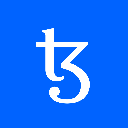-
 Bitcoin
Bitcoin $117500
-0.28% -
 Ethereum
Ethereum $3558
0.05% -
 XRP
XRP $3.392
-1.64% -
 Tether USDt
Tether USDt $1.000
-0.04% -
 BNB
BNB $728.3
-0.65% -
 Solana
Solana $175.4
-0.82% -
 USDC
USDC $0.9998
-0.01% -
 Dogecoin
Dogecoin $0.2398
1.83% -
 TRON
TRON $0.3179
-2.38% -
 Cardano
Cardano $0.8204
-0.07% -
 Hyperliquid
Hyperliquid $44.07
-0.62% -
 Stellar
Stellar $0.4581
-1.03% -
 Sui
Sui $3.790
0.35% -
 Chainlink
Chainlink $18.16
1.68% -
 Hedera
Hedera $0.2643
-0.28% -
 Avalanche
Avalanche $24.22
2.25% -
 Bitcoin Cash
Bitcoin Cash $512.2
-0.43% -
 Shiba Inu
Shiba Inu $0.00001479
0.54% -
 Litecoin
Litecoin $111.1
8.86% -
 UNUS SED LEO
UNUS SED LEO $8.986
0.08% -
 Toncoin
Toncoin $3.194
-0.68% -
 Polkadot
Polkadot $4.337
1.87% -
 Uniswap
Uniswap $10.02
-1.95% -
 Monero
Monero $321.7
1.05% -
 Ethena USDe
Ethena USDe $1.001
-0.04% -
 Bitget Token
Bitget Token $4.870
0.73% -
 Pepe
Pepe $0.00001325
1.35% -
 Dai
Dai $0.9999
0.00% -
 Aave
Aave $314.1
-2.09% -
 Cronos
Cronos $0.1203
1.58%
Is OKX regulated in Europe?
OKX complies with European regulations like MiCA and holds licenses in countries such as Malta, Lithuania, and Cyprus, offering services under local rules while preparing for evolving crypto laws.
Jul 14, 2025 at 10:21 am
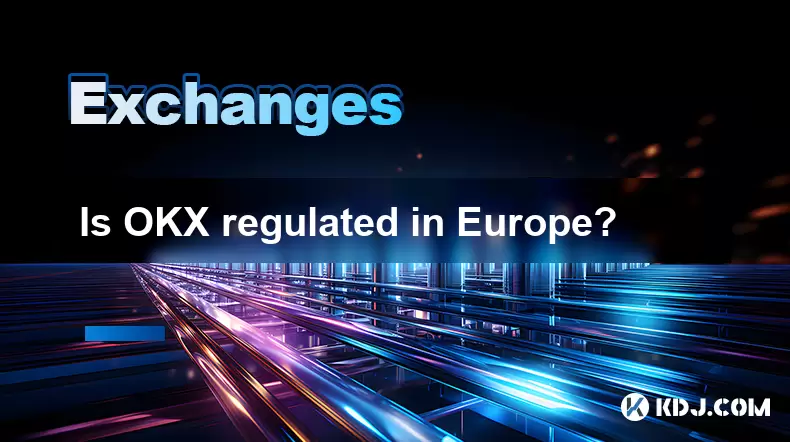
What Is OKX and Its Global Presence?
OKX is a prominent cryptocurrency exchange that provides services such as spot trading, futures, options, and staking for a wide range of digital assets. With millions of users globally, it has expanded its operations across multiple jurisdictions, including Europe. The platform positions itself as compliant with local regulations in the countries where it operates. However, the regulatory landscape for crypto exchanges varies significantly from one region to another.
In Europe, financial authorities have been actively developing frameworks to regulate digital asset platforms. The European Union (EU) has introduced directives like MiCA (Markets in Crypto-Assets), which aims to create a unified regulatory environment for cryptocurrencies across member states. As part of this evolving scenario, exchanges must comply with specific licensing requirements and reporting obligations.
Understanding Regulatory Frameworks in Europe
Each country within Europe has its own regulatory body overseeing financial markets, including cryptocurrency exchanges. For example, Germany’s BaFin, France’s AMF, and Malta’s MFSA are among the key institutions involved in regulating crypto businesses. These agencies require exchanges to register or obtain licenses before offering services to residents.
OKX has taken steps to align itself with certain European regulators, although it does not operate under a single overarching EU license. Instead, the exchange seeks compliance on a per-country basis, adapting its offerings to meet local laws. This includes implementing KYC (Know Your Customer) procedures, AML (Anti-Money Laundering) checks, and maintaining transparent transaction records.
Does OKX Hold Licenses in Specific European Countries?
In some jurisdictions, OKX has obtained formal approval to conduct business. For instance, in Malta, OKX applied for and received a registration under the MFSA's Virtual Financial Assets (VFA) regime, allowing it to provide certain crypto-related services. Similarly, in other countries like Lithuania and Cyprus, OKX has pursued local authorizations to ensure legal operation.
However, it is important to note that these licenses often come with limitations. They may only permit specific activities, such as custody or brokerage services, rather than full-fledged exchange operations. Therefore, users should verify what services are available based on their location and whether OKX holds appropriate permissions in that jurisdiction.
How Does OKX Comply With MiCA and Other EU Regulations?
As the EU prepares to implement MiCA, which will take effect in phases starting in 2024, OKX has expressed commitment to adhering to the new rules once they apply. MiCA introduces comprehensive requirements for transparency, whitepaper disclosures, and stablecoin regulation, among others. Exchanges operating within the EU will need to adjust their systems and processes accordingly.
To prepare for MiCA, OKX has reportedly engaged legal experts and compliance officers to assess its readiness. It has also updated internal policies regarding user verification, transaction monitoring, and data protection to align with upcoming standards. Despite these efforts, until MiCA becomes fully enforceable, the extent of OKX’s compliance remains subject to interpretation and ongoing evaluation by regulators.
User Considerations When Using OKX in Europe
For European users considering OKX, understanding the regulatory status is crucial for assessing risk. While the platform claims to follow local laws, regulatory compliance does not guarantee immunity from enforcement actions or operational risks. Users should research whether OKX is registered with their national regulator and what protections exist in case of insolvency or fraud.
Additionally, users should familiarize themselves with dispute resolution mechanisms offered by OKX and local consumer protection laws. In some cases, European investors may be covered under compensation schemes if an exchange fails. However, crypto assets often fall outside traditional insurance frameworks, making due diligence essential before depositing funds.
Frequently Asked Questions (FAQ)
1. Can I trade derivatives on OKX in Europe?
OKX offers derivative products, but availability depends on regional restrictions. In many European countries, access to leveraged crypto products is limited or prohibited due to regulations aimed at retail investor protection.
2. Is my personal data safe with OKX under GDPR?
OKX claims to comply with the General Data Protection Regulation (GDPR), which governs data privacy in the EU. Users should review OKX’s privacy policy and ensure they understand how their information is collected, stored, and shared.
3. Are deposits and withdrawals on OKX in Euros regulated?
Handling fiat currencies like EUR requires adherence to banking and financial regulations. OKX partners with licensed payment providers to facilitate EUR transactions, ensuring compliance with local laws governing fiat gateways.
4. Does OKX report user activity to European tax authorities?
While OKX does not automatically report user activity to tax authorities, users are responsible for declaring their crypto transactions. Some European countries require exchanges to submit transaction data, so users should consult local tax guidelines.
Disclaimer:info@kdj.com
The information provided is not trading advice. kdj.com does not assume any responsibility for any investments made based on the information provided in this article. Cryptocurrencies are highly volatile and it is highly recommended that you invest with caution after thorough research!
If you believe that the content used on this website infringes your copyright, please contact us immediately (info@kdj.com) and we will delete it promptly.
- SUI Altcoin: Primed for Potential 100x Gains?
- 2025-07-20 04:50:12
- Panicked, Child, Swallowed Coin: A Parent's Worst Nightmare (and What to Do)
- 2025-07-20 04:35:12
- WLFI Token Tradability: World Liberty Finance's Bold Move Under Trump's Crypto Wing
- 2025-07-20 04:50:12
- Floki Price Rockets: Breakout Rally or Meme Coin Mirage?
- 2025-07-20 04:35:12
- Tinubu, the North, and Appointments: Too Little, Too Late?
- 2025-07-20 03:20:15
- Stellar Blade Hacked: When Crypto Scams Target Your Favorite Games
- 2025-07-20 03:50:12
Related knowledge
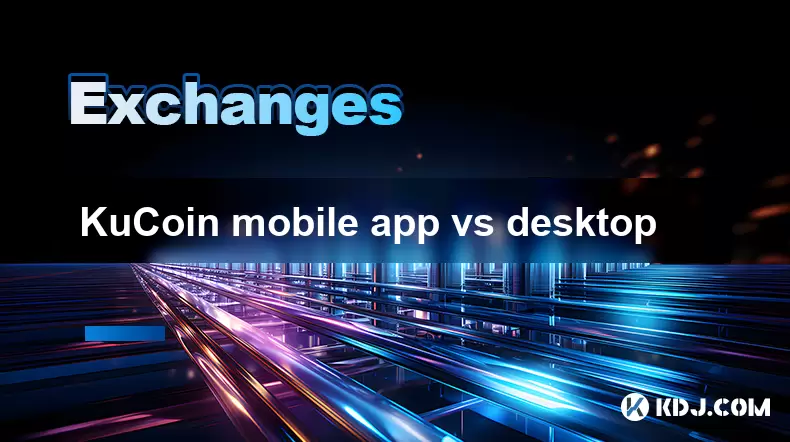
KuCoin mobile app vs desktop
Jul 19,2025 at 08:35am
Overview of KuCoin Mobile App and Desktop PlatformThe KuCoin ecosystem offers both a mobile app and a desktop platform, each designed to cater to diff...
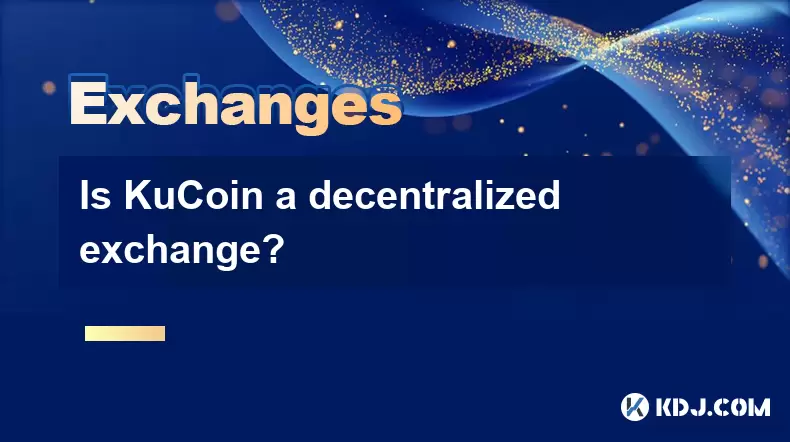
Is KuCoin a decentralized exchange?
Jul 18,2025 at 03:15pm
Understanding Decentralized Exchanges (DEXs)To determine whether KuCoin is a decentralized exchange, it's essential to first understand what defines a...
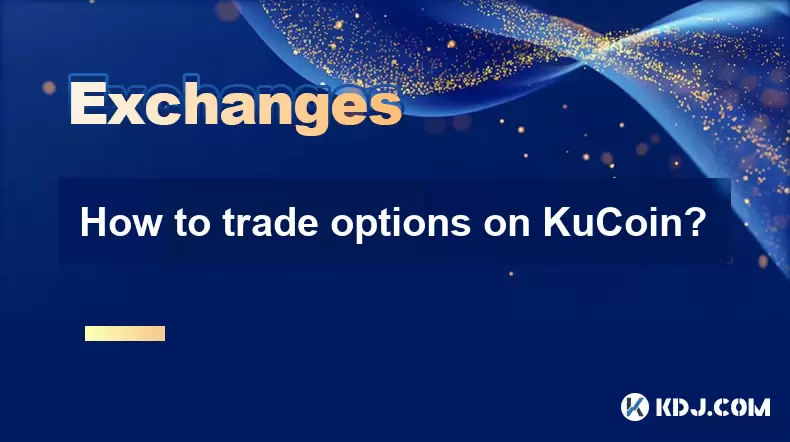
How to trade options on KuCoin?
Jul 19,2025 at 03:42am
Understanding Options Trading on KuCoinOptions trading on KuCoin allows users to speculate on the future price movements of cryptocurrencies without o...
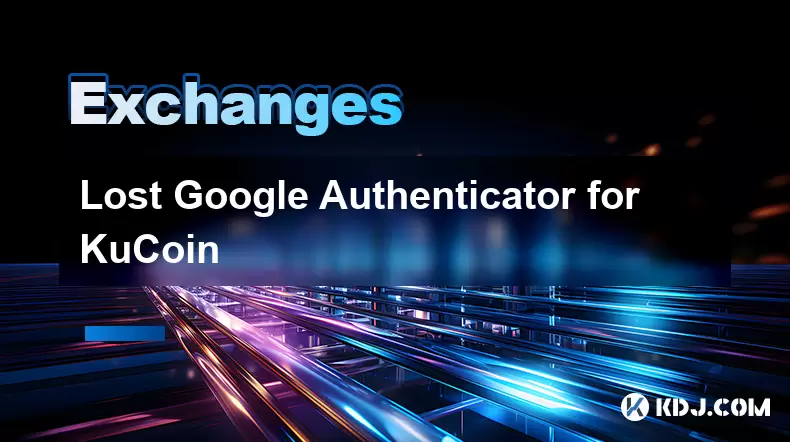
Lost Google Authenticator for KuCoin
Jul 19,2025 at 02:35am
Understanding the Importance of Google Authenticator in KuCoin SecurityGoogle Authenticator is a critical tool used by KuCoin users to enable two-fact...
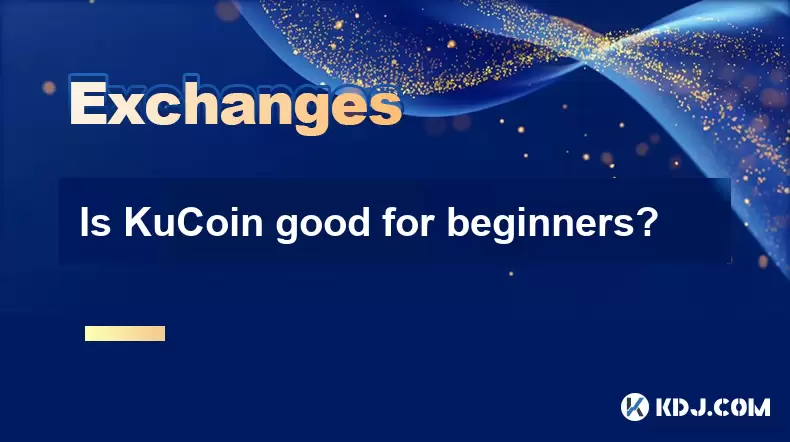
Is KuCoin good for beginners?
Jul 20,2025 at 05:36am
What Makes KuCoin a Suitable Option for Beginners?KuCoin is often regarded as a user-friendly cryptocurrency exchange that can be suitable for beginne...
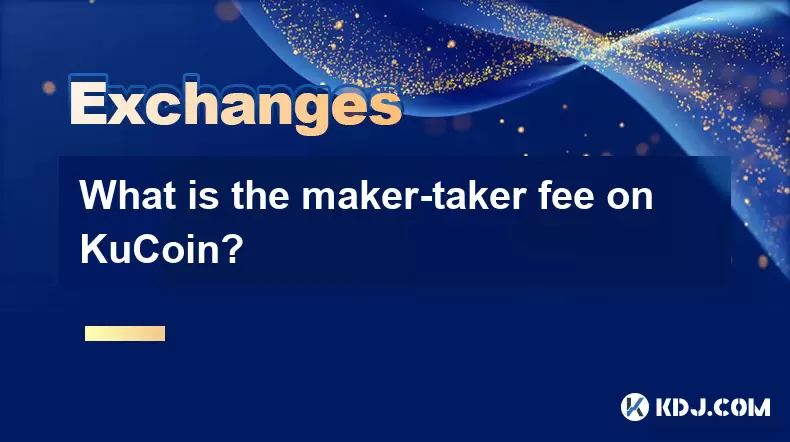
What is the maker-taker fee on KuCoin?
Jul 18,2025 at 12:42pm
Understanding the Maker-Taker Fee ModelThe maker-taker fee model is a pricing structure used by many cryptocurrency exchanges, including KuCoin, to de...

KuCoin mobile app vs desktop
Jul 19,2025 at 08:35am
Overview of KuCoin Mobile App and Desktop PlatformThe KuCoin ecosystem offers both a mobile app and a desktop platform, each designed to cater to diff...

Is KuCoin a decentralized exchange?
Jul 18,2025 at 03:15pm
Understanding Decentralized Exchanges (DEXs)To determine whether KuCoin is a decentralized exchange, it's essential to first understand what defines a...

How to trade options on KuCoin?
Jul 19,2025 at 03:42am
Understanding Options Trading on KuCoinOptions trading on KuCoin allows users to speculate on the future price movements of cryptocurrencies without o...

Lost Google Authenticator for KuCoin
Jul 19,2025 at 02:35am
Understanding the Importance of Google Authenticator in KuCoin SecurityGoogle Authenticator is a critical tool used by KuCoin users to enable two-fact...

Is KuCoin good for beginners?
Jul 20,2025 at 05:36am
What Makes KuCoin a Suitable Option for Beginners?KuCoin is often regarded as a user-friendly cryptocurrency exchange that can be suitable for beginne...

What is the maker-taker fee on KuCoin?
Jul 18,2025 at 12:42pm
Understanding the Maker-Taker Fee ModelThe maker-taker fee model is a pricing structure used by many cryptocurrency exchanges, including KuCoin, to de...
See all articles


















































































